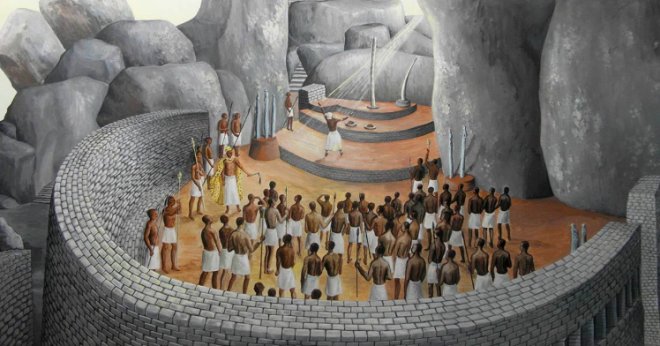|
Centred at the magnificent city of Great Zimbabwe (above), this empire built awe-inspiring stone structures without the use of mortar- a feat of engineering that still mystifies experts today. The Great Enclosure and the Hill Complex stand as monuments to a sophisticated society that grew wealthy from cattle, agriculture, and, most importantly, gold. Through an extensive trade network that reached the Swahili coast, the kingdom's gold and ivory were traded for goods from as far away as China and Persia.
The mid-19th century brought dramatic and violent change. The arrival of the Ndebele people (a branch of the Zulus), led by King Mzilikazi, fled the Mfecane wars in present-day South Africa, and conquered the Rozwi Empire, establishing the powerful Mthwakazi Kingdom in the western part of modern day Zimbabwe. This set up a new political dynamic just as European interest in the region intensified. The pivotal figure in the colonisation of the territory was the British imperialist Cecil John Rhodes. Through his British South Africa Company (BSAC), Rhodes sought to exploit the region's immense mineral wealth. In 1888, his agents secured the Rudd Concession from the Ndebele King Lobengula - a deeply controversial and deceptive treaty that granted sweeping mining and administrative rights in exchange for rifles and a steamboat. This concession was used to justify the arrival of the "Pioneer Column" in 1890 and the subsequent occupation of Mashonaland. Following this treaty, the British Government gave the BSA Company a mandate in 1889 to colonise the area that was to become Southern Rhodesia, however the displacement and subjugation of the local Shona and Ndebele peoples did not go unanswered. The First Chimurenga (or First War of Liberation) of 1896–1897 saw a united, spirited uprising against BSAC rule. Despite their acknowledged bravery, the rebellion was brutally suppressed, and its leaders, including spirit mediums Mbuya Nehanda and Sekuru Kaguvi, were executed. Following this defeat, colonisation began in earnest and the territory was formally named "Rhodesia" in honour of Rhodes, with a system of white minority rule established. |
Zimbabwe History |
Zimbabwe History |
Zimbabwe History | Zimbabwe History |
 |

|
In 1922 Rhodes' British South Africa Company mandate over the area was ended and, despite being in a minority, the whites in the area voted for self-government. Shortly afterwards, they consolidated their position by introducing the Land Apportionment Act in 1930, effectively precluding blacks from land possession (at least any decent farm land) and a further labour law four years later preventing black Africans from entering skilled trades and professions. As a result of these Acts, the systematically disenfranchised native black population was at the beck and mercy of the whites, being effectively forced to work on whatever wages and conditions were applied in white factories and mines and on white farms.
In 1953 the British government responded by creating the Central African Federation (bottom, left), made up of Southern Rhodesia (Zimbabwe), Northern Rhodesia (Zambia) and Nyasaland (Malawi) which was to last for ten years until Malawi and Zambia were granted independence in 1963 with African-majority governments. However Southern Rhodesia was not granted independence in the same manner as no consensus could be agreed on the nature of the post-independence government, with the British wanting a multi-racial democracy against the express wishes of the ruling white minority government.
This action by South Africa gave ZANU and ZAPU fresh impetus and they stepped up their nationalist independence campaigns operating mainly out of Mozambique and Zambia, eventually forcing the Rhodesian government to the negotiating table. This led to peace talks at Lancaster House in London in 1979 paving the way for a ceasefire and democratic elections under a new constitution for the country which guaranteed black rights. On April 18, 1980, the nation of Zimbabwe was born, with Robert Mugabe as its first Prime Minister.
The early years of independence were filled with hope and remarkable progress, particularly in expanding education and healthcare to the majority population. However, the post-independence era has been fraught with challenges. The 1980s were scarred by the Gukurahundi massacres in Matabeleland, a dark chapter in the nation's history. Beginning in 2000, a controversial and often violent fast-track land reform program aimed to address the colonial imbalance in land ownership. However, this resulted in a catastrophic decline in agricultural production and contributed to severe economic instability and hyperinflation. Decades of rule under Robert Mugabe were marked by political tensions and economic decline, culminating in his removal from power in 2017. Today, Zimbabwe stands at another crossroads. It is a nation grappling with the deep legacies of its past—from its glorious empires to its colonial history wounds and post-independence struggles. |

 As the Kingdom of Zimbabwe declined, the Kingdom of Mutapa (c. 1430–1760) rose to prominence in the north. Founded by Prince Nyatsimba Mutota (right), this empire expanded its influence over a vast territory. It continued the lucrative gold trade and was the first major regional power to have sustained contact with Europeans, specifically Portuguese traders who sought to control its resources, ultimately contributing to the decline of the Mutapa Empire in the early seventeenth century. From its ruins emerged a new aggressive Rozwi Empire (c. 1660–1866) which established dominanace and expunged the Portuguese through military prowess, auguring peace and prosperity for the next two centuries with the centres of Dhlo-Dhlo, Khami, and Great Zimbabwe reaching their peaks. These pre-colonial empires demonstrate a long history of centralised governance, complex economies, and rich cultural traditions long before the Scramble for Africa began.
As the Kingdom of Zimbabwe declined, the Kingdom of Mutapa (c. 1430–1760) rose to prominence in the north. Founded by Prince Nyatsimba Mutota (right), this empire expanded its influence over a vast territory. It continued the lucrative gold trade and was the first major regional power to have sustained contact with Europeans, specifically Portuguese traders who sought to control its resources, ultimately contributing to the decline of the Mutapa Empire in the early seventeenth century. From its ruins emerged a new aggressive Rozwi Empire (c. 1660–1866) which established dominanace and expunged the Portuguese through military prowess, auguring peace and prosperity for the next two centuries with the centres of Dhlo-Dhlo, Khami, and Great Zimbabwe reaching their peaks. These pre-colonial empires demonstrate a long history of centralised governance, complex economies, and rich cultural traditions long before the Scramble for Africa began.



 This triggered a rising intolerance of colonial rule and the emergence of nationalist groups including the Zimbabwe African National Union (ZANU) and the Zimbabwe African People's Union (ZAPU) led by Ndabaningi Sithole (right) and later Robert Mugabe, reflecting a rapid radicalisation of the work force against a background of increasing numbers of African countries succeeding in throwing off their colonial 'masters' and establishing themselves as independent republics.
This triggered a rising intolerance of colonial rule and the emergence of nationalist groups including the Zimbabwe African National Union (ZANU) and the Zimbabwe African People's Union (ZAPU) led by Ndabaningi Sithole (right) and later Robert Mugabe, reflecting a rapid radicalisation of the work force against a background of increasing numbers of African countries succeeding in throwing off their colonial 'masters' and establishing themselves as independent republics. Ian Smith, then Prime Minister, broke this impasse on 11th November 1965 by making a Unilateral Declaration of Independence (UDI) entrenching its apartheid-style rule, which effectively expelled Rhodesia from the international community and triggered sanctions against his regime. This act pushed the nationalist movements toward armed conflict, sparking the Second Chimurenga, also known as the Rhodesian Bush War (c. 1964–1979). Despite this, Smith's position remained relatively secure until South African Prime Minister B.J. Vorster unexpectedly turned against the Smith regime, removing border police and limiting supplies into Rhodesia including fuel and ammunitions, severely hampering Smith's ability to contain the ongoing insurgency.
Ian Smith, then Prime Minister, broke this impasse on 11th November 1965 by making a Unilateral Declaration of Independence (UDI) entrenching its apartheid-style rule, which effectively expelled Rhodesia from the international community and triggered sanctions against his regime. This act pushed the nationalist movements toward armed conflict, sparking the Second Chimurenga, also known as the Rhodesian Bush War (c. 1964–1979). Despite this, Smith's position remained relatively secure until South African Prime Minister B.J. Vorster unexpectedly turned against the Smith regime, removing border police and limiting supplies into Rhodesia including fuel and ammunitions, severely hampering Smith's ability to contain the ongoing insurgency. Following this election, Ian Smith stayed in parliament as the official opposition leader with his renamed party, the Republican Front, remaining a whites only party, however it was attracted dwindling support and, at the subsequent election of 1985, Smith found himself out of parliament and in retirement. He remained in Zimbabwe as an outspoken critic of Robert Mugabe until relocating to an ex-pat Rhodesian community in 2006 in South Africa to live with his bereaved daughter-in-law. He died the following year aged 88. Some look back on his rule and conclude that "the policies of his Rhodesia Front party radicalised black nationalists and directly spawned the violent and fascist rule of Zanu PF."
Following this election, Ian Smith stayed in parliament as the official opposition leader with his renamed party, the Republican Front, remaining a whites only party, however it was attracted dwindling support and, at the subsequent election of 1985, Smith found himself out of parliament and in retirement. He remained in Zimbabwe as an outspoken critic of Robert Mugabe until relocating to an ex-pat Rhodesian community in 2006 in South Africa to live with his bereaved daughter-in-law. He died the following year aged 88. Some look back on his rule and conclude that "the policies of his Rhodesia Front party radicalised black nationalists and directly spawned the violent and fascist rule of Zanu PF." 


